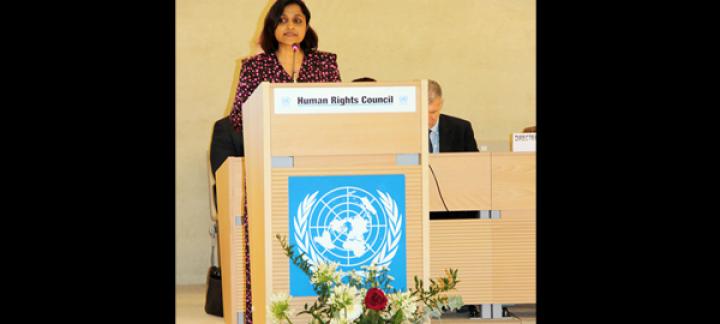01 March 2012, Geneva;The Minister of State for Foreign Affairs, H.E. Ms. Dunya Maumoon, today spoke at the High-level Segment of the UN Human Rights Council and used the occasion to express the Government's determination to ensure that the successes and achievements of the Maldives' democratic transition would not be lost. "It is our commitment to you today that we are determined to go forward, not backwards" she said. The State Minister also provided information on events which lead to the resignation of former President Nasheed and and appointment of President Waheed, and outlined the new Government's key priorities in the field of human rights.
The State Minister informed the 47 members of the Council, as well as other delegates and NGOs, that since the adoption of the 2008 Constitution and the country's first multiparty elections, which themselves were the culmination of the four-year Reform Agenda, the country's young democracy has "not been consolidated, nurtured and strengthened".
"An independent review of our political and legal system...would" said the State Minister, "show that crucial work such as strengthening of independent institutions and the completion of the secondary legislative framework to implement the rights and principles foreseen in the new constitution have not been completed: that the strengthening of the judiciary has failed to keep pace with the changes taking place across the rest of Maldivian society; and that key independent oversight bodies need to be strengthened in order to fulfill their important roles in the system of democratic checks and balances".
The State Minister then described the Government's roadmap and said that in the field of human rights, President Waheed's administration had set itself four goals.
First, in order to build back stronger and learn lessons from past mistakes, the State Minister informed delegations that the Government has announced a full inquiry into events which lead to and ensued from the resignation of former President Nasheed.
Second, she announced that the new Government has committed itself to work with the judiciary and all other parties to strengthen the judicial sector so that it can gain the trust and respect of the whole population. In this regard, she reaffirmed invitation to the High Commissioner for Human Rights to send a team of Eminent International Jurists to the Maldives to advise on reform.
Third, the State Minister said the Government has committed ourselves to significant strengthening and depoliticizing of the country's various independent oversight bodies - including the Human Rights Commission, the Police Integrity Commission, and the Elections Commission.
"And finally," she said "we will attempt to secure an all-party consensus to expedite those legislative bills which have been sidelined since 2008 and which are so desperately needed. This includes the new revised Penal Code, the Criminal Procedure Code, the Evidence Bill, the Legal Aid Bill, the Juvenile Justice Bill and the Judicature Bill - all vital for the proper functioning of the justice system; a Freedom of Information Bill; and a new Prison and Parole Bill".
In conclusion, the State Minister admitted that "this is an ambitious agenda, and one that we can only achieve with the support of all parties in the Maldives. Our hope is to work with all domestic and international stakeholders to complete these core unfinished parts of the Maldives' democratic and human rights reform agenda, so as to ensure that whichever government comes to Office after the next elections, will do so with the benefit of a more complete democratic system with robust independent institutions that work in the national interest and for the rights and well-being of all Maldivian citizens".
ENDS.


